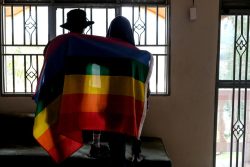
Altar servers lead the opening processional at the Immaculate Conception of Maria, La Carpio, Catholic church where the majority of the congregation is made up of Nicaraguan exiles and refugees, in San Jose, Costa Rica, Sunday, Feb. 19, 2023.
10:52 JST, March 10, 2023
SAN JOSÉ, Costa Rica (AP) — For two hours each afternoon, the Catholic priest listens to confessions behind a glass wall where anyone nearby can spot him. Yet that visibility is deceptive; he yearns to keep his name and exact whereabouts a secret to the outside world.
He began hearing confessions within a few days after recently fleeing to Costa Rica from Nicaragua, where the government has imprisoned religious leaders, activists and numerous outspoken critics of President Daniel Ortega.
The priest agreed to an interview on condition his name and new home base be withheld. He fears for his loved ones, who still live in Nicaragua, and hopes they’ll be safe as long as he remains discreet.
He is not alone. Many priests and nuns in exile worry about reprisal from Ortega and fear going public with their stories.
“There is persecution of the church because the church is the voice of the people,” the priest said.
A human rights organization, Nicaragua Nunca Más, estimates that more than 50 religious leaders have fled since 2018, when a social security reform triggered massive protests. Last year, two congregations of nuns – including from the Missionaries of Charity order founded by Mother Teresa – were expelled.
Other church personnel — including priests, seminarians and lay staff members, were among the 222 Nicaraguans released from detention and forcibly expelled to the United States on Feb. 9.
The priest interviewed in Costa Rica left his Nicaragua hometown so hastily that there was no time for goodbyes. In the sole company of a driver, he travelled by car, then by motorcycle. Once near the Costa Rican border, he walked.
“I miss my people, my nation,” he said, his voice breaking.
Ortega initially asked the Catholic Church to play a role as a mediator as political tensions rose over the past five years, but the first round of dialogue didn’t last long. After priests sheltered demonstrators inside their parishes and expressed concern about excessive use of force, Ortega targeted them as “terrorists” who backed opposition efforts to undermine or overthrow him.
Nicaragua Nunca Más and CSW, a British-based organization that advocates for religious freedom around the world, say Ortega’s government has targeted evangelical pastors, as well as Catholic personnel. Yader Valdivia of Nicaragua Nunca Más said at least 50 evangelical churches have been shut down.
The two organizations have gathered testimonies from dozens of people – some in exile and some still in Nicaragua – who have described harassment, threats, physical violence and arbitrary detention targeted at a range of religious workers. There are multiple accounts of masked men breaking into churches, theft or destruction of religious objects, and the prohibition of religious processions.
CSW said parishioners are warned not to display holy symbols outside their homes, while detainees are denied visits from clergy and barred from keeping a Bible in prison.
Among the remaining prisoners, the highest-profile Catholic cleric is Bishop Rolando Álvarez of Matagalpa. Before his arrest last year, his image was seen around the world as he knelt in front of security forces after being barred from celebrating Mass inside his church and deciding to pray in the streets.
An outspoken critic of the government, Álvarez was sentenced to 26 years in prison and stripped of his Nicaraguan citizenship on Feb. 10, the day after Ortega released and sent to the U.S. the planeload of opposition figures.
In Nicaragua, Catholic leaders’ response to the government’s repression has been muted, apparently in an attempt to not inflame tensions. Commenting last month on Álvarez’s imprisonment, Cardinal Leopoldo Brenes of Managua – Nicaragua’s capital – said, “Pray that the Lord gives him strength.”
Reynald Gaitán, a former seminarian who met Álvarez in Matagalpa and currently studies theology in Costa Rica, believes that the bishop’s imprisonment could be problematic for Ortega.
“If Monsignor were to die, his cause would continue to live because we will always remember him as a martyr,” Gaitán said.
Two priests who were released and exiled on Feb. 9 — after spending several months in a Nicaraguan prison — shared some of their experiences with Catholic faithful at a recent Mass in Miami.
They described how they had no inkling of their upcoming release until they were told suddenly to change from prison uniforms to their regular clothes and put on buses heading to the airport.
The priests recounted the emotional flight to the U.S., with former prisoners hugging one another and crying with both relief and the sorrow of leaving families behind who are still at risk should they speak publicly about their ordeals.
“When the church seemingly was trying to be a voice for the voiceless, … the Ortega regime went after the church,” said Miami Archbishop Thomas Wenski, who has met with some of the exiled clergy and seminarians.
Nicaragua is the second poorest country in the Americas after Haiti, according to the World Bank. Facing poverty, unemployment and repression, most Nicaraguans crave spiritual reassurance. Around 42% of the population is Catholic and 35% evangelical.
“The church in Nicaragua plays a very important role,” said the priest interviewed by The Associated Press in Costa Rica. “It is the one who cares for the poor, who always tells the truth and remains close to its people.”
He recalls his hometown as a humble place, where parishioners are deeply religious. Threats against him surfaced, he said, when he started referring during Mass to the difficult situation facing the church.
Policemen patrolled around the parishes and attended Masses dressed as civilians to monitor what was said during the homily, he recalled. Parishioners were frequently interrogated regarding the speeches of their priests.
“There is a lot of fear, even among the lay people who speak out,” he said. “We cannot say anything and, if we do, we know there’s a price to pay.”
Elsewhere in Costa Rica, the AP spoke with one of the Nicaraguan nuns who was expelled last year. Like the priest, she requested anonymity because her family stayed behind.
She remains baffled by the expulsion order, saying her work was devoted to children and the elderly.
“Wherever people saw us, they greeted us. They welcomed us in their homes,” she said.
Her faith remains strong.
“I pray for my country,” she said. “I think that everyone does, not just me. We pray so that we can live calmly, in peace.”
Top Articles in News Services
-

Survey Shows False Election Info Perceived as True
-

Hong Kong Ex-Publisher Jimmy Lai’s Sentence Raises International Outcry as China Defends It
-

Japan’s Nikkei Stock Average Touches 58,000 as Yen, Jgbs Rally on Election Fallout (UPDATE 1)
-

Japan’s Nikkei Stock Average Falls as US-Iran Tensions Unsettle Investors (UPDATE 1)
-

Japan’s Nikkei Stock Average Rises on Tech Rally and Takaichi’s Spending Hopes (UPDATE 1)
JN ACCESS RANKING
-

Producer Behind Pop Group XG Arrested for Cocaine Possession
-

Japan PM Takaichi’s Cabinet Resigns en Masse
-

Man Infected with Measles Reportedly Dined at Restaurant in Tokyo Station
-

Israeli Ambassador to Japan Speaks about Japan’s Role in the Reconstruction of Gaza
-

Videos Plagiarized, Reposted with False Subtitles Claiming ‘Ryukyu Belongs to China’; Anti-China False Information Also Posted in Japan



























